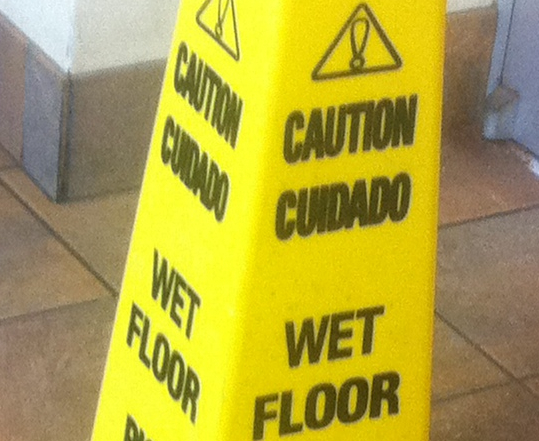The following not to be published decision from the Court of Appeals addresses the duties owed to a licensee vs. an invitee and how the distinction made a difference to the plumber whose suit was dismissed and affirmed on appeal.
Rozeboom vs. Hugh Jass Burgers LLC
COA NPO 6/28/2013
TAYLOR, JUDGE: Wes Rozeboom brings this appeal from an April 3, 2012, summary judgment of the Fayette Circuit Court dismissing Rozeboom’s premises liability action against Hugh Jass Burgers, LLC. We affirm.
Rozeboom asked permission from the manager of Hugh Jass Burgers to enter the restaurant and repair the waterline for eCampus.com. The manager of Hugh Jass Burgers gave Rozeboom permission to enter the restaurant. On the day of the accident, Rozeboom entered the restaurant at approximately 8:00 a.m., before the restaurant opened to the public. After working for several hours, Rozeboom started removing his tools from the restaurant, and after a couple of trips, he slipped on a greasy spot on the floor and fell, causing a fracture to his tibial plateau.
Rozeboom contends that the circuit court improperly rendered summary judgment by dismissing his premises liability claim against Hugh Jass Burgers. In particular, Rozeboom claims that he was an invitee at the time of his injury as his work also benefited Hugh Jass Burgers. Rozeboom believes the circuit court erroneously concluded that he was a licensee or independent contractor at the time of his injury.
The resolution of this appeal revolves solely upon the issue of whether Rozeboom was an invitee at the time of his injury. Rozeboom believes he was an invitee; conversely, Hugh Jass Burgers argues he was not an invitee but rather was a licensee. For the following reasons, we conclude that Rozeboom was a licensee and was not an invitee.
In this Commonwealth, an individual is considered an invitee if:
(1) he enters by invitation, express or implied, (2) his entry is connected with the owner’s business or with an activity the owner conducts or permits to be conducted on his land and (3) there is mutuality of benefit or benefit to the owner.
West v. KKI, LLC, 300 S.W.3d 184,190 (Ky. App. 2008) (quoting Johnson v. Lone Star Steakhouse & Saloon of Kentucky, Inc., 997 S.W.2d 490, 491-92 (Ky. App. 1999)).
Therefore, to constitute an invitee, it must be initially determined whether the individual entered the premises upon the invitation of the landowner. Such invitation may be either expressed or implied. Shoffner v. Pilkerton, 292 Ky. 407, 166 S.W.2d 870 (1942). An express invitation normally occurs through the verbal language of a landowner, and an implied invitation occurs when:
[T]he owner or occupant does something or permits something to be done which fairly and reasonably indicates to the person entering the premises, that his presence is consistent with the intentions and purposes of the occupant, and leads the one entering to believe that the use is in accordance with the design or purpose for which the place is adapted, and to be used in mutuality of interests.
Shoffner, 166 S.W.2d at 873. By contrast, an individual who enters the premises upon the mere permission of a landowner is considered a licensee. The distinction between invitation or permission of a landowner is pivotal to the determination of the status of the entrant. This distinction has been eruditely explained:
[A]n invitation is conduct which justifies others in believing that the possessor desires them to enter the land; permission is conduct justifying others in believing that the possessor is willing that they shall enter if they desire to do so. . . .
Mere permission, as distinguished from invitation, is sufficient to make the visitor a licensee, as stated in § 330; but it does not make him an invitee, even where his purpose in entering concerns the business of the possessor. . . .
Restatement (Second) of Torts § 332 cmt. b (1965).
In the case at hand, Rozeboom asked permission to enter the restaurant for the sole purpose of repairing a leaky pipe for eCampus.com. For this limited purpose, the manager of Hugh Jass Burgers consented to Rozeboom’s entry. Rozeboom was not employed by Hugh Jass Burgers and performed no repairs at the behest of Hugh Jass Burgers. Additionally, Rozeboom entered the restaurant at 8:00 a.m., well before it opened to the general public and did not dine at the restaurant.
From these facts, it is clear that Rozeboom did not enter the restaurant upon the express or implied invitation of Hugh Jass Burgers. Rather, the manager of the restaurant merely gave Rozeboom permission to enter the restaurant if he desired to do so. And, the mere fact that Rozeboom’s entry may have indirectly benefited Hugh Jass Burgers does not equate to an implied invitation under the particular facts herein. Simply stated, the undisputed facts indicate that Rozeboom’s entry into the restaurant was the direct result of his own insistence for the benefit of eCampus.com and was not at the express or implied invitation of Hugh Jass Burgers. Thus, we conclude that by entering the restaurant by request and upon the permission of the manager of the restaurant, Rozeboom was legally a licensee at the time he suffered his injury.
Accordingly, being a licensee at the time of his injury, the circuit court properly rendered summary judgment dismissing Rozeboom’s premises liability action against Hugh Jass Burgers, LLC.
For the foregoing reasons, the summary judgment of the Fayette Circuit Court is affirmed.

